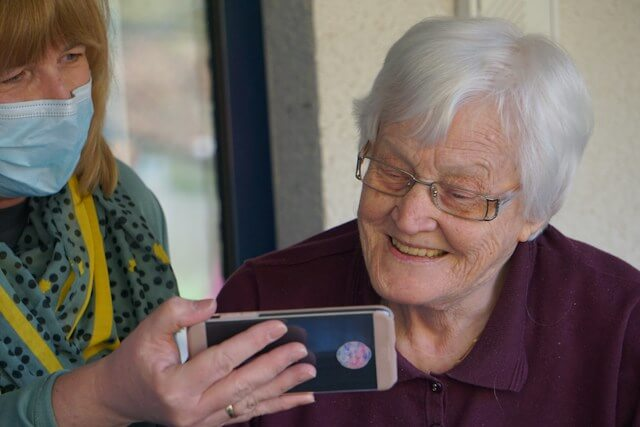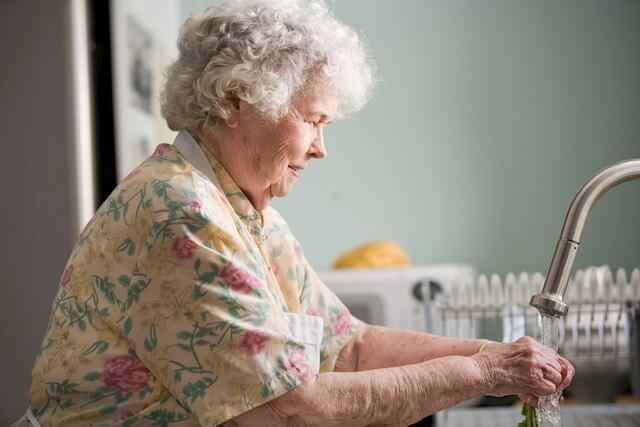All humans, without exception, age. You can do a lot to slow this down and prevent it but there will always come a time when you can do no more. At that point there is nothing to ask for but help. But who do you ask? Who do you impose that burden on? Well, there is actually a profession dedicated to exactly that need.
Whether it is you or a loved one, and whether it is from old age or sickness, in-home care is always an option. But not everyone knows what in-home care entails.

What is in-home care?
In-home care is exactly what it sounds like: Someone, usually a medical professional, administers care in the comfort of your home. The reason it is not always a medical professional who administers this home care is because in-home care is actually an independent discipline from the practice of medicine.
Most in-home care professionals will have medical experience, but it is just as often experience being an EMT or combat medic as it is being a nurse or a doctor. Some people worry about this, as they only trust medical professionals with their personal care and in-home care. In-home CDS caregivers have their own licensing process though.
And besides, if you have ever seen an EMT work, then you know they are just as capable of relieving a person’s pain and healing their discomfort as any licensed doctor.
But if it one does not require a doctor, then do they really need in-home medical care?
Why in-home care?
The definition of in-home care is more flexible than people tend to think. What it tends to mean is that a caregiver can help with daily living for someone who has trouble bathing, eating, dressing themselves, using the toilet, or taking care of their personal hygiene. It can also include doing household chores as cooking, cleaning, doing laundry and shopping.
And of course, medical care is sometimes needed as well, such as medication management and physical therapy. What is often overlooked is the emotional care a caregiver can provide. That means they can be a companion, a planner and participant in activities, or a simple conversation partner.
These are especially valid jobs for an in-home caretaker who deals with the elderly. The most spry senior citizen can still get lonely.
But a person does not need to be incapable of doing all of these things in order for them to receive in-home care or home health services. In fact, a person can be quite capable, but needs a caregiver to help them with personal therapy.
A caregiver can be sought out even for the emotional needs alone without family. Imagine you lost your entire family. Maybe you do not need to imagine. But a person with no parents, no siblings, no cousins, and no grandparents has very little emotional safety net. No one has to suffer alone, without family, and a caregiver can be there for you.
In-home care can happen for two reasons: The first is that it can be part of someone’s recovery from chronic disease or injury. This means that it is not quite “needed”, but it can make life a lot easier.
The second reason is that it is needed. Anyone who cannot perform the five basic tasks of self-care (bathing, eating, dressing, using the restroom, and attending to personal hygiene) is considered “needing” a caregiver. This usually only applies to older adults or people suffering from serious chronic conditions or advanced old age.
That is why you might need in-home care. But once you know that you (or a loved one) needs it, how do you go about getting the in home care that you need?

How do I access in-home care?
There are two ways to go about acquiring an in-home caregiver.
Home Care Agency
A home care agency is a business that manages the home care services of a network of caregivers and healthcare professionals. They will be licensed by the state they do business in, meaning that their qualifications and performance are a matter of public record. You can scrutinize them by these means and judge whether they fit your family and needs.
One of the most important questions to ask a home care agency is how long they have been in business. If they have not been in business long, see if you can get information on how long their caregivers have worked for them. It is possible a young business might hire good caregivers, and it is best to be sure.
Before you hire anyone be sure that they are licensed and insured. They have to be in order to provide in-home care services. You should also look at how the agency trains, supervises, and monitors their workers. Failing to provide any of this information is cause for concern, as an agency failing to give you exact answers to these questions is a huge red flag that they might not be as capable as they make themselves out to be.
Lastly, ask the agency for a packet of service information. This packet should describe what they are qualified to do, their fees, and a list of references that can vouch for their work. This should all be done before you even talk to an agency representative. You do not want to be smooth-talked. You want documentation of skill.
Private Hire
Hiring a private in-home caregiver will come with a lot of the same scrutiny and paperwork as hiring from a home care agency. Some people hire their home health services privately to avoid that sort of thing, but you really should not cut corners when it comes to in-home health care services or professionals. A private hire should be licensed and insured as well.
Of course, this also means they should have their services, skills, qualifications, fees, and references all in writing for you. This is basic procedure for contracting anyone to do anything, so do not trust a private hire who cannot provide these. Whether they provide them immediately or after a short period, they must provide them.

Pros and cons of a home care agency
Pros
● You can screen potential caregivers, hire and fire them, pay them, and manage taxes through the agency.
● Home care agencies offer a wide variety of caregivers, meaning you have more to pick from.
● A plurality of independent caregivers means a more complex schedule/care routine can be accommodated by employing multiple independent caregivers together.
● Agency can substitute caregivers should your primary caregivers get sick or take breaks.
● Agencies will provide alternates should the family member or caregivers need to be replaced.
● Can help settle disputes between you, the person receiving the care, and the caregiver.
● Usually covered by long term care insurance.
Cons
● May schedule multiple attendants to provide care, which means orienting and adjusting multiple times.
● May lose the employees that make the agency worth investing in.
● May limit or charge more for certain (sometimes critical) tasks.
● Most times will be more expensive than a private hire.
Pros and Cons of a private hire
Pros
● You get exactly who you want on exactly your terms based on your own screening criteria.
● Private hires are more flexible in what tasks they are willing and able to perform.
● Cheaper than going through an agency.
● More opportunity to build a long term relationship and family caregiver alliance with the caregiver.
Cons
● You have to replace any worker that gets sick or takes a break.
● It is your responsibility to pay, hire, and fire employees, as well as manage taxes and insurance.
● Your private hire might not be covered by long term care insurance.
Questions to ask while interviewing a in home caregiver
Here are some initial questions for the interview:
● Why are you interested in this position?
● Where have you worked before?
● What were your duties? How do they compare to the job description I’m offering you?
● What is your favorite and least favorite kind of client?
● Is there anything in the job description that you are uncomfortable doing?
● How do you deal with someone living with memory problems? Give an example.
● Describe your experience making meals for other people.
● How do you handle people who are angry, stubborn and/or fearful?
● What is your experience transferring someone out of bed or chair and into a wheelchair?
● What is your availability? Days? Hours?
● Can you give me two work-related and one personal reference I can contact?
● I’ll need personal identification that verifies that you can work in this country. Please bring it with you so that I can make a copy.
Generally, you are trying to get a handle on how ready they are for the job. Whether they will be cooking meals, bathing someone, or helping an anxious old person, you need to know that they will not get frustrated or give up just because things get hard. This is on top of their paperwork, which also needs to be in order.
Important elements to include in a contract
There is an onus on you to include a few things in the contract you offer any caregiver. You need to tell them exactly what you mean for them to do, the hours they will do it per day and what days they will do it on, as well as their pay rate. The contract is malleable, so you can change it if anything changes during negotiations.

How can home caregivers be paid?
Home caregivers can be paid in:
● Medicaid
● Long-term insurance
● Private pay
● Workers’ comp
● Veteran benefits
And that is just about everything you need to know. It is a lot to work through, but it is worth it. An in-home caregiver can be life changing for you or your family members.
Share This Article
